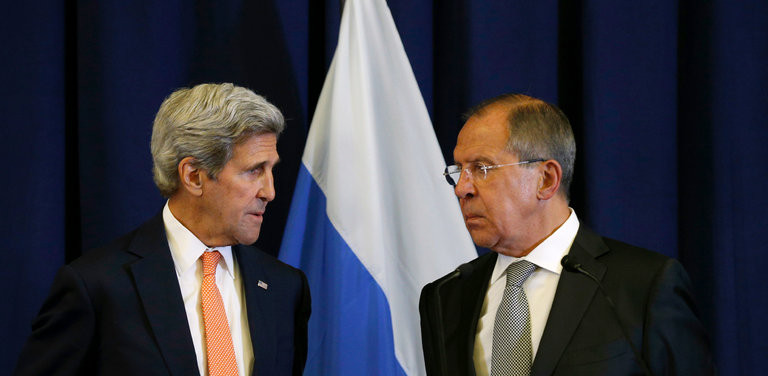PHOTO: US Secretary of State John Kerry and Russian Foreign Secretary Sergei Lavrov, September 2016
Even as the Assad regime and its allies — Russia, Iran, Hezbollah, and other foreign forces — besiege and bomb eastern Aleppo city into submission, US Secretary of State John Kerry still pursues his Quixotic vision of a political resolution.
Four US Administration officials have told Josh Rogin of The Washington Post that the effort as is “a long shot at best, but also the only chance” to persuade the Assad regime and Moscow to halt military operations. One said:
We are still actively trying to push it. We are not giving up on this. We think we need to give it a chance.
According to the officials, an agreement will “separate” rebels from the jihadists of Jabhat Fatah al-Sham (formerly Jabhat al-Nusra), in return for an end to the Russian-regime siege imposed in late August.
The officials did not explain how this separation would occur, given that there have been few members of JFS/Nusra in eastern Aleppo city since an agreement with other rebel factions for withdrawal in 2015. Instead, they appeared to be following the Moscow line — as Washington has done for months — that this “separation” is the fundamental for any discussions.
Nor did the officials appear to countenance that Russia has put out that line to fend off any talks while Moscow and the Assad regime tried to choke the opposition areas and eventually overrun them.
Instead of considering why a brief ceasefire collapsed in September — with Russia and the Assad regime renewing operations with the bombing of a UN aid convoy — the officials merely said that Kerry’s current effort is “not being advertised” in light of that failure.
And the officials seem to have swept away Kerry’s line from October that US political talks with the Russians were being suspended because of the Russian-regime bombing killing hundreds of civilians in eastern Aleppo. With no reference to that declaration, the sources said:
There have been several meetings between U.S. and Russian diplomats in Geneva to discuss the deal, and Kerry has been conducting bilateral discussions with all the players. He speaks to Russian Foreign Minister Sergei Lavrov about twice a week and met with him this month in Lima, Peru. Kerry met with allies to discuss the plan this month in Abu Dhabi, United Arab Emirates.
Already the signs of Moscow’s tactics — spin out talks while continuing the military route — are piling up: “The United States and Russia cannot agree on how many Conquest Front fighters are in Aleppo. Also, there’s a dispute over whether the Assad regime will determine who governs eastern Aleppo if the cease-fire holds.”
One official cuts through the latest spin to set out reality: “The Russians are trying to force the city to surrender. They only need 60 more days. And they’ll get it.”
Still, the Secretary of State tilts at the windmills. As Rogin summarizes:
A frustrated Kerry still has not been given authority by the White House to bring any meaningful pressure to bear against Assad or Russia, placing him in a weak negotiating position. The prospect of Hillary Clinton being elected president gave Kerry some leverage, because she was expected to pursue a more hawkish Syria policy, officials said.
That measure of hope all but vanished when Donald Trump won the election.
This is not a sudden development, despite Trump’s surprise victory. Russia has been playing the US to buy time since August 2013, after the Assad regime’s chemical weapons attacks near Damascus. To get the space for its intervention in September 2015 to prop up the regime and to push back rebels, it continued to dangle the “political process”. And it has done so throughout 2016 to fend off any resistance to plans to regain Aleppo and areas near Damascus.
Put bluntly, Russian President Vladimir Putin has never had any intention of accepting an outcome short of a capitulation to the Assad regime. And President Assad, needless to say, has been happy with that approach.
The combination of the Russian-Iranian-Hezbollah-regime success in Aleppo, after years of siege and bombardment reducing much of the city to rubble, is not the start of a new era. It merely continues what has gone before in Homs, the Damascus suburbs, and many towns and villages across Syria. Donald Trump does nothing to alter this process, even if his embrace of Putin is likely to give symbolic support to it.
And still Kerry presses on, in the final weeks of a failure across years.

